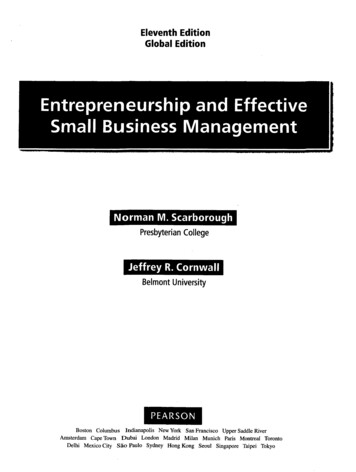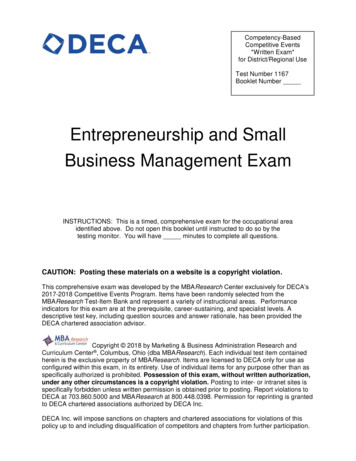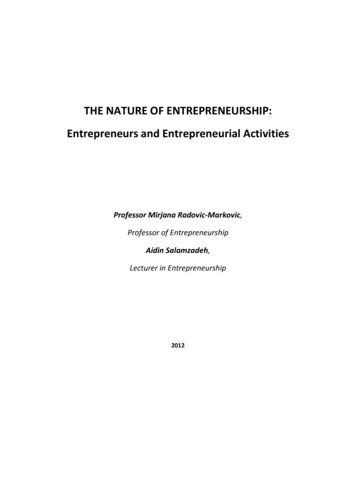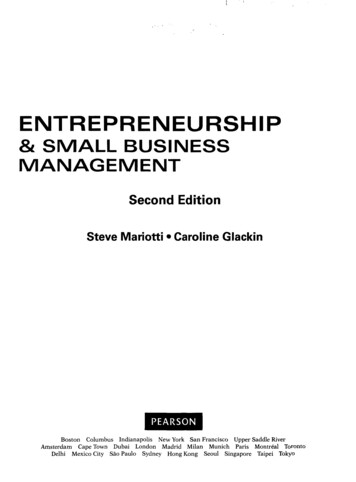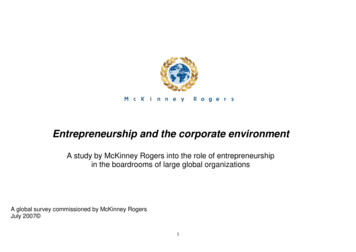
Transcription
Entrepreneurship and the corporate environmentA study by McKinney Rogers into the role of entrepreneurshipin the boardrooms of large global organizationsA global survey commissioned by McKinney RogersJuly 2007 1
Contents1Why did McKinney Rogers commission this survey?2Overview3The survey findings5Qualitative results6About McKinney Rogers7Contacts8How the research was conducted2
1. Why did McKinney Rogers commission this survey?McKinney Rogers works closely with large, global organizations helping them to define and deliver strategy throughout theiroperations. This starts at the top with the business leaders and Mission Leadership . This is a key component of the McKinneyRogers service offering, focusing on leadership behaviors – how we think; how we act; and how we relate to others. Much hasbeen written and reported in the media about the ‘entrepreneur’ and their defining successes, but there is little recent originalresearch into the attributes and attitudes that are considered part of the makeup of the entrepreneur, particularly on an internationalbasis. McKinney Rogers recognizes the importance of behaviours that categorize an entrepreneur being of equal benefit in theboardroom in the modern business environment and this study is designed to gauge awareness, perceptions and trends in thecorporate environment surrounding entrepreneurial skills.The results of this survey of managers and ‘C’ level employees (main board level employees – CEO, CTO, COO) in some of theworld’s largest organizations have significance for businesses of all sizes, helping them to recognize entrepreneurial qualities, andnurture and reward them for best business practice and leadership.3
2. Overview Entrepreneurship can be developed There has been a shift change in the perception of an entrepreneur, with 51%overall believing it can be developed, rather than inherited at birth (39%). Emerging markets more likely to believe that entrepreneurial qualities can be developed When broken down acrossthe geographic regions, emerging markets such as Africa are more likely to hold the view that entrepreneurial qualities canbe developed, indicating perhaps a more flexible approach than within more rigid, established markets such as Europe. Majority see the importance of entrepreneurship in large organisations Almost three quarters of respondents (69%)believe that in today’s business environment, it is important for large organizations to develop a core competence ofentrepreneurship. Only 22% believe it very or fairly unimportant highlighting the need for companies to adapt and change toa more entrepreneurial approach to business. Corporate entrepreneurship focuses more on behavioral objectives than operational processes Interestingly, inorder to develop ‘corporate entrepreneurship’ within an organization, people and behavior related objectives such asencouraging ownership and developing an entrepreneurial culture featured more highly than operational focus areas such ascreating and developing new ventures and products and services. Encouraging risk-taking appears bottom of the priorities,contradicting the common stereotype of the typical entrepreneur. CEO must be strong communicator but not high on list of key qualities for an entrepreneur The survey askedrespondents to rank certain attributes of an entrepreneur and CEO/President in order of importance. The biggestdiscrepancy was relating to being a ‘strong communicator.’ Whilst this was top of the list for a CEO (76%), it was also thecharacteristic that saw the largest difference between the two, with only 51% considering strong communication as animportant characteristic for entrepreneurs. Business leaders and entrepreneurs can not ‘go it alone.’ Independence is ranked low in list of key qualities Akey part of the study focuses on the differing perceptions of C level respondents and managers with very interesting results.There are some commonalities such as entrepreneur attributes centered around being passionate, energetic and highly4
motivated with independence featuring low on the list of priorities, reflecting perhaps the recognition that there is little placefor ‘going it alone’ in a successful modern business. Next generation of business leaders see blurring of lines between successful CEO and entrepreneur There are alsocommonalities between managers and C level views on a successful CEO – energetic, driven, persistent and decisive.However, the research shows that many managers think that qualities C level people attribute to entrepreneurs, should bekey characteristics of a CEO, such as a strong communicator, passionate and a risk taker. Perhaps this reflects the shiftingnature of business as increased global competition, new markets and a faster pace drives the need for innovation and risktaking, more typically associated with entrepreneurs at the top of large organizations, to remain successful. Managers, asthe next generation of business leaders, are recognizing and driving this change. CEOs need the flexibility and innovation of entrepreneurs to keep up with the pace of change in the modernbusiness world Whilst regulation and compliance have preoccupied the Chief Executive of late, dealing with socialresponsibility issues and the environment are becoming increasingly important, driving the need for the flexibility andinnovation associated with entrepreneurs. Leaders of large organizations have to be more entrepreneurial to keep up withthe pace of change and managers fully believe (66%) that anyone can develop into an entrepreneur. This is nearly twice(34%) of C level respondents.5
3. The findings3.1 Whole sample – Can anyone develop into an entrepreneur or is 'entrepreneurship' something people have to be born with?Don'tknow10%Can develop51%Born with39%6
3.2 Global perceptions – Can anybody develop entrepreneurship or is it something people have to be born with?Don't know100%90%80%70%60%50%40%30%20%10%0%Anyone can develop into an entrepreneurBorn with88%44%4%4%Africa50%48%42% 42%38%12%8%APEurope717%USA & Carib
3.3 C-level versus managers – Can anyone develop into an entrepreneur or is 'entrepreneurship' something people have to beborn 9%10%9%0%Anyone can developinto an entrepreneurBorn with8Don't know
3.4 In today's business environment how important is it for large organizations to develop a core competence of entrepreneurship?Don't know4%Very unimportant11%Fairly either important norunimportant3%
3.5 How important are the following in achieving 'corporate entrepreneurship' in a large organization (‘very important’)?Encouraging ownership of problems & opportunities72%Developing an entrepreneurial culture47%Developing new types of business model46%Creating & developing new products & services46%Creating & developing new ventures39%Encouraging risk-taking38%0%1020%40%60%80%
3.6 Most important attributes of a successful entrepreneur compared with a 11
3.7 Most important attributes for a successful entrepreneurHighly sive60%Visionary58%Persistent53%Strong 0%IntuitiveIndependence isnot a key qualityfor either anentrepreneur ora CEO33%In 0%Passion is amust have forentrepreneurs,butdecisivenessis moreimportant in aCEO
3.8 Most important attributes for a successful CEO/PresidentStrong communicator76%Decisive70%Highly motivated69%Visionary66%PassionateEntrepreneursare notexpected to bein control, farmore importantfor a CEO58%In aker23%0%10%20%30%1340%50%60%70%80%CEOs must bestrongcommunicatorsbut not soimportant forentrepreneurs
3.9 Agree/strongly agree with the following:Employees' entrepreneurial qualities will become moreand more important for large organisations as the paceof change and competition continue to increase87%A lot of large organisations would benefit from beingmore entrepreneurial86%A lot of large organisations would benefit from employingmore people with entrepreneurial qualities78%Entrepreneurs are very good at starting and buildingbusinesses but not good at running large corporations50%It is very difficult for an entrepreneur to reach the top of alarge organisation44%0%1420%40%60%80%100%
4.0 Percentage who believe it is very important for large organizations to develop a core competence of %0%USA & Carib15Africa
4.1 Percentage who believe the following are very important for achieving entrepreneurship in large organizationsUSA & CaribEuropeAPAfrica69%64%69%Creating and developing new products25%Creating and developing new ventures40%36%83%69%25%38%32%Encouraging employees to take risk46%33%37%Encouraging employees to take ownership of problemsand opportunities48%58%37%Developing new types of business model46%21%Creating an entrepreneurial culture0%1620%62%56%58%40%40%54%60%80%100%
4.2 Most important attributes of a successful entrepreneur as viewed by ‘C-level’ versus managersC-levelManagers4.54.2543.753.517
4.3 Most important attributes of a successful CEO as viewed by ‘C-level’ versus managersC-level4.754.54.2543.753.518Managers
4.4 In today's business environment how important is it for large organizations to develop a core competence of entrepreneurship?C-level versus agers19
5. Qualitative findings (Based on interviews with five senior business leaders)“I think a lot has to do with the true freedom given to them in their work environment. You find certain organizations that totallyenforce entrepreneurship or intrapreneurship, and they do force that into the team. They actually don‟t mind you taking the risk,they give you that freedom to succeed. Some organizations pay lip service to it and some actually do give you some kind offreedom but with barriers. I think you tend to find that more in start-ups, or in more of technology-based organizations.”“I think a successful CEO wants to learn more, is more entrepreneurial, takes risks, is a tenacious, focussed, charismatic typeleader rather than someone who is more of an administrator.”“You look back at some of the companies we have now, they‟ve only ever got to where they are today because they‟ve been set upby entrepreneurs. Some of them have had to be broken down into smaller business units, after they‟ve grown so big, have to be letgo so they could foster growth when I look at 3M, back then they had a lot of innovative people. Innovation made them one of thebiggest companies.”“In industries like technology where the model lifecycle is getting shorter and shorter, the consumer attention span is also gettingshorter and shorter. You must have that kind of innovative environment to keep producing new and exciting stuff.”“People can become entrepreneurs despite the fact that they were raised in traditional environments. The difference is theyprobably never fitted into that traditional environment from the beginning – they were people who always challenged the status quo,were nonconformists to a certain extent.”“With technology and the ability of technology the world is changing so fast and a CEO must always be open to change. A CEOmust never fear having to let go of what they are, for what they are about to become. If you live in the past, you probably aren‟tgoing to be to successful in the future.”“If you‟re lucky enough to work in an organization that respects entrepreneurship, where you can step out of those boundaries, andsee things in different ways and propose different things, I absolutely do think entrepreneurs can grow. Most of the fastest growing20
individuals in the organization tend to be somewhat entrepreneurial in what they do. They see things from a different perspectiveand often do different things that tend to deliver big results for businesses.”“I can‟t think of a business that would say „hang on a second, I only want traditional, non-experiential types of managers sitting inmy business‟”.“Accepting failure as part of the culture, because people don‟t try if they are afraid of failing having values of „if you fail we‟re notgoing to kick you out the first time. Obviously you can‟t continue to fail forever but what have you learned from that failure? Let‟sdiscuss that‟.”“Make risks part of the culture, become a risk taking organization. And in order to do that you have to accept that failure will be partof your day-to-day experience.”“I would say I‟m not an entrepreneur, I happen to be in an entrepreneurial role, and so I think you can dial-up some of the ways ofworking that are required to be a successful entrepreneur, but I think ultimately to be successful you either are born with it or not,that is my view.”“I think that real breakthrough strategy is hard to achieve, unless you have a significant number of entrepreneurs within anorganization. And I think that‟s where large organizations are quite schizophrenic, in that they‟re desperately looking for whitespace, breakthrough strategy, new initiatives, and yet they just don‟t quite know how to encompass that within their culture andorganization.”“If you want to develop and foster that (entrepreneurial) type of culture, then it‟s not about getting one or two people in, it‟s aboutmaking a significant impact to the teams within which these people operate.”“When a company is very well established, entrepreneurship is less important. But in some situations I strongly believe thatentrepreneurship is crucial. For example, when you are at the beginning of a new business, or even when you are trying to turnaround a company that is in a very bad situation, to establish a new strategy, to engage p
enforce entrepreneurship or intrapreneurship, and they do force that into the team. They actually don‟t mind you taking the risk, they give you that freedom to succeed. Some organizations pay lip service to it and some actually do give you some kind of freedom but with barriers.


